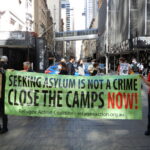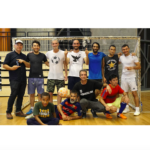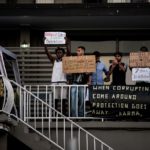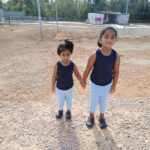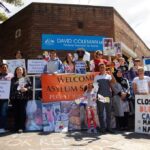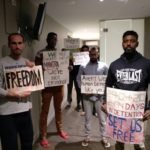Punishing, Silencing and Detaining the Innocent: An Interview With Refugee Farhad Rahmati
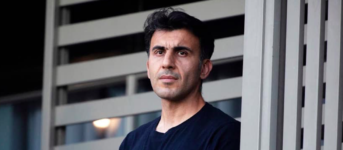
On 29 October 2020, refugee Farhad Rahmati was forcibly removed from the Brisbane Immigration Transit Accommodation (BITA) facility and taken to the nearby airport, where he was handcuffed, placed on a plane, flown down to Sydney and locked up at Villawood Immigration Detention Centre.
The long-term detainee – who was processed as a genuine refugee in 2017 – was given no notice that he was being transferred. Farhad was simply told he was going without any explanation or being given any time to collect his belongings.
ABC Brisbane radio host Rebecca Levingston explained on Tuesday that Farhad was removed on 29th following an interview she’d carried out with him. And this wasn’t the first time. Back in June, when she first spoke to him, Rahmati was afterwards transferred from Kangaroo Point to BITA.
Levingston was able to track down Farhad at Villawood earlier this week and she spoke to him again. He told the radio host that he believes he’s being transferred from facility to facility in order to punish him for speaking out to the media about the plight of long-term detainees.
Seeking a better life
Mr Rahmati is a 42-year-old civil engineer from Khorramabad in Iran. He grew up during the 1980s Iran-Iraq war. And he chose his profession as he wanted to build rather than destroy.
Early last decade, Farhad fled persecution in his homeland seeking a better life. And on arriving in Australian waters in 2013, he was initially detained on Christmas Island.
But, despite our nation having ratified the 1951 Refugee Convention, Farhad was then sent to Manus Island to undergo long-term indefinite detention: a program of which the International Criminal Court has deemed illegal and involving cruel, degrading and inhuman treatment.
In July last year, Farhad was transferred to Australia under the Medevac laws, so he could undergo medical treatment, after two doctors assessed this as necessary. He was then placed in Brisbane’s Kangaroo Point Central Hotel, which is now classed as an alternative place of detention (APOD).
Kangaroo Point has since become the focus of a refugee protest movement comprised of a number of groups, including Refugee Solidarity Meanjin. And it was in mid-June, during a 24/7 activist blockade of the hotel, that ABF officers first moved in and forcibly transferred Rahmati to BITA.
Cruel policy
If you speak to refugee advocates, they’ll tell you that it’s not uncommon to transfer detainees in order to punish them.
Kurdish refugee Farhad Bandesh was transferred from Melbourne’s Mantra Hotel – currently an APOD – to MITA in April after he appeared on the ABC’s Q&A to speak out about hotel detention.
And more disturbingly, refugee Saif Ali Saif was transferred from Kangaroo Point to BITA, after he attempted to take his own life a fortnight ago. Saif had endured a year of being able to regularly see his wife and young child – who live in community detention – on the footpath outside the hotel.
Sydney Criminal Lawyers spoke to Farhad Rahmati about his prison-style transfer from Brisbane to Villawood, how he’s waiting for the determination on his US resettlement application, and his thoughts on why he’s being singled out.
Firstly, while you were at Kangaroo Point activists began supporting the detainees being held in the hotel. Farhad, what was that like for those inside?
That was the start of the blockade. That was about three or four months ago. And we loved it.
We loved seeing people supporting us, because the government tried to hide us: to keep us out of sight, out of mind. That’s what happened on Manus and Nauru. They kept us on those islands so people couldn’t see us.
But at Kangaroo Point, we found an opportunity to let people know about our situation when we had the chance to go to the balcony. And this chance was given to us as a result of the pandemic.
There are three different buildings at Kangaroo Point. We used to be in two buildings. And we had no access to the balcony.
But when the pandemic came, they couldn’t keep everyone at BITA because of social distancing. It was four in each room at BITA. But then they decided to get two out of each room.
So, there was no space to keep that number in BITA. And they needed a new idea and that was the other building at Kangaroo Point: the main one with access to the balcony.
When we found this opportunity, we started our daily protest on the balcony, and people saw us. So, the cat was out.
In mid-June, you were removed from Kangaroo Point and placed in BITA. Why were you transferred?
The ABF felt that I was a leader and had influence on protesters. That was their idea, which is not right.
I am just a detainee. I am someone who was there and thanked these people because they were showing their love to us.
That was the reason they moved me.
Since mid-June, you were being held at BITA, but last week, you were moved to the Villawood immigration facility in NSW. What happened there?
I had an ABC interview on 11 June, and on the same day they removed me from Kangaroo Point. Then, a few days before they brought me here, I had another interview with the ABC and I was removed from BITA.
I’ve had three ABC interviews. The last one was only a couple of days ago. So, right now, I’m expecting them to rush to my room at any time and handcuff me like the last two times to send me somewhere else.
Who knows where? Maybe Christmas Island.
So, that’s how you are feeling now?
Absolutely, because I had the interview with the ABC in June. And the same day I had that interview at 7 o’clock, at 8 o’clock about five or six officers rushed into my room and handcuffed me.
There was one on my right, one at the left and one at the back. That’s the way I was moved out of Kangaroo Point in June.
This time, I was doing my daily exercise early morning and they called me for a meeting with the ABF.
I went to the interview room. I was told I was going to be transferred without any explanation. They confiscated my phone right away. And I had no way of knowing what was going on.
They put me in a van, drove me to Brisbane airport, handcuffed me at the airport and put me on a charter flight with another eighteen 501s – if you know what 501s are.
Yes, they’re noncitizen residents who are being deported for having been given prison sentences that add up to more than 24 months.
Yeah. So, I was the only refugee there.
The whole time from Brisbane airport to Villawood, Sydney, I was handcuffed. This was for someone who has never committed a crime. Honestly, what is that?
Two officers escorted me all the way from Brisbane to Villawood: one at my right and one at my left.
Why are there such security measures for someone who has never committed a crime?
From the interview room, they took me out of Brisbane from the backdoor in order to not let anyone see me being removed.
And why has this been done to you?
I have absolutely no idea. I had a long conversation with my case manager here. Case managers are from immigration. They’re saying that this movement is an ABF operation. They’re not involved, and they have no idea.
I thought the transfer was for my US application, but as soon as I got here, I emailed the company involved in the US process and after a couple of days, they replied and said my case is still waiting on security checks.
So, that means I have not been accepted to the US yet. It might come anytime. But what I am highlighting is the reason for this movement is not the US process, because still I have not been accepted.
And lastly, Farhad, it’s coming on close to eight years since you first came to Australia seeking asylum. How would you sum up what’s happened to you?
What can justify it? Eight years of imprisonment. That’s eight years of mental torture. Eight years of being in limbo. I’m not sure what can justify that.
So far, I have lost eight of my best years of life. I am not going to get that back. It’s gone. And what have I done? What’s my crime? Why should I be in this situation for eight years?
Seeking asylum in Australia, is that a crime? Is that worth detention for eight years? I’m sure based on Australian law you have to commit a serious crime to end up with eight years’ imprisonment – a very serious crime.
But for us from Manus and Nauru, we have committed no crime, but we’re still in this situation. A solution should have come a long time ago. It shouldn’t have come to this point.
Right now, we’re in a pandemic situation. There’s a big shortage of workers here in Australia, and the farms are being destroyed because there’s no labour.
I’m wondering why the government doesn’t try and take advantage of this situation. Of course, the resettlement should be based on humanity. I understand that. We deserve to be given that right.
But the reality is the government has closed its eyes to this right and they keep torturing us. So, why not take advantage of this situation. They have a lot of people in detention. On the other hand, there is a shortage of workers in Australia.
Why not give us a chance that could lead to permanent residency. At the same time, it would solve the problem.
This shortage of labour is not going to be solved easily because the borders are closed, and it will remain like that for a long time. There are farmers crying out for labourers.
It should be based on humanity, but it’s not. I have not seen any humanity from the government over the past eight years.
Of course, out there, people are so lovely, and they have shown us another level. There’s no doubt about that.
But with the government, at least be smart and take advantage of the situation.


